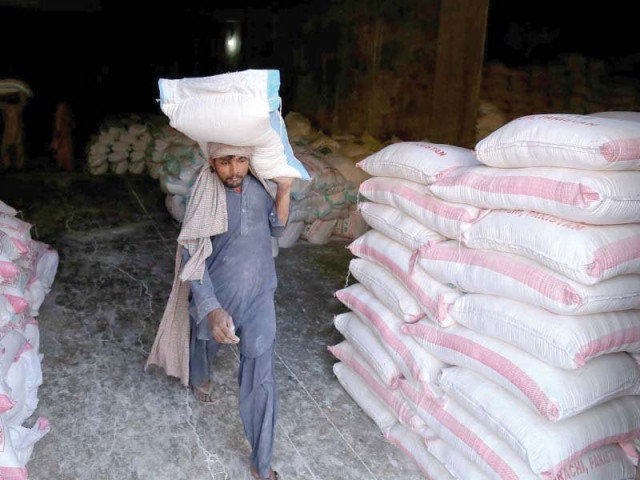Murad orders crackdown against wheat hoarders
Centre and Sindh blame each other for crisis as prices remain high across province

A labourer hauls a sack of wheat flour at a godown in Karachi. PHOTO: INP
He took this decision while presiding over a meeting on the wheat crisis in Sindh at the CM House on Monday.
Shah said that he had received reports that some traders were hoarding wheat in their godowns, leading to a rise in market prices. "We cannot allow the poor people of this province to suffer at the mercy of hoarders," he claimed.
The chief minister was told that as of January 13, the price of wheat flour was Rs43 per kilogramme across the province. He said that there were still around 300,000 tonnes of wheat in the Sindh food department's godowns, adding that the government had to release wheat until March 15, when the fresh crop is harvested and arrives in the market.
He was further informed that 77,000 sacks of wheat procured from Pakistan Agricultural Storage and Services Corporation (Passco) had been released in Karachi and 25,000 sacks in Hyderabad, while more were being procured from Passco godowns in Punjab and Balochistan.
Shah further directed the Sindh food department to ask flour millers to set up stalls and provide wheat flour to the people at the rate of Rs43 per kg, warning that he would take strict action if prices were not stabilised within two days.
'Irresponsible behaviour'
Meanwhile, Sindh Information and Labour Minister Saeed Ghani condemned the 'irresponsible behaviour' of federal ministers with regard to the wheat flour crisis.
"If the crisis was only in Sindh, then the Sindh government could be blamed, but it is foolish to declare us responsible when the crisis is all over the country," he maintained while talking to the media on Monday. He further said that if Pakistan Tehreek-e-Insaf (PTI) leaders believed the Sindh government and chief minister should be held responsible, then the prime minister should first be held accountable and made to resign.
Ghani claimed that the recent goods transporters strike was the only reason for the crisis emerging in Sindh, adding that since the strike was over, the crisis would also be resolved soon. He said that 400,000 tonnes of wheat was to be transported in Sindh, but only 100,000 tonnes could be supplied due to the strike.
On the other hand, PTI provincial parliamentary leader Haleem Adil Sheikh pointed the finger of blame at the 'notorious corruption mafia of Sindh' during a press conference outside the Sindh Assembly.
"The wheat flour crisis has gone from bad to worse in the last few days, but the Sindh government, instead of controlling it, is busy giving misleading statements and blaming the federal government to hide its own incompetence," he claimed, adding that the provincial government had failed to lift its wheat stockpiles from the Passco godowns for three months.
Claiming that the ruling 'mafia' stocked wheat and then sold it when prices had rocketed, he said, "They have left no stone unturned to increase hunger and poverty in Sindh through their corrupt practices."
Crisis uneased
Meanwhile, as the Centre and the province blamed each other, flour prices went up to Rs70 per kg in many districts of Sindh. Even sale points fixed by the Sindh government, selling flour at subsidised rates, have not yet eased the situation.
The apparent failure of the Sindh food department and the district administrations in the province has allowed the flour mills to inflate the price even though the official supply of wheat to mills continues at around Rs3,400 per 100kg. "There is no denial about the shortage of wheat, but a lack of regulation by the authorities has allowed the prices to balloon," conceded a food official, who requested anonymity.
"The flour is being sold between Rs64 to Rs70 in Thatta," said Jamshed Jokhio, a resident of the district. In the neighbouring Sujawal district, the local administration raided the mills and fined them for charging a price in excess of the government-approved rate.
In Tharparkar district, where malnutrition continues to take a toll on children, the flour was sold as high as Rs75 per kg in Chachro taluka on Sunday. The local mills told buyers that they were not receiving adequate supplies of wheat.
Nazeer Mallah, a Matiari resident, claimed that some mills were charging up to Rs80 per kg, while prices varied between Rs60 to Rs70 in Badin and Dadu.
Long queues of people were seen waiting their turn to buy flour from the government points in Hyderabad. Although they were asked to show their national identity cards for the purchase, there was no bar on the quantity they could procure.
Published in The Express Tribune, January 21st, 2020.



















COMMENTS
Comments are moderated and generally will be posted if they are on-topic and not abusive.
For more information, please see our Comments FAQ